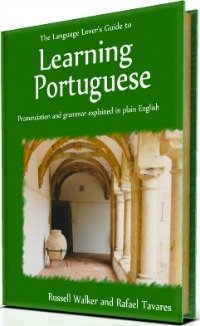By dividing our vocabulary in categories of Portuguese words,
we learn quickly!
Então, como vai? When I talk about categories of Portuguese words, I mean: 1. Nouns or words that give a name to people, things, places or ideas, like: problema [problem], ônibus [bus], casa [house], amigo [friend], etc. Nouns are always either masculine or feminine, singular (one) or plural (many). In Portuguese, nouns are also preceded by a determinant (see below).2. Verbs or doing words, like: falar [to speak], estar [to be], ajudar [to help], etc.3. Adjectives or descriptive words, like: grande [big], pequeno [small], verde [green], pesado [heavy], etc..3. Prepositions or linking words, like: "De" [of] or [from], em [in] or [at], or [on], com [with], para [to] or [towards], etc..4. Connector words that link 2 sentences together, like: mas [but], e [and], contudo [however], etc.5. Determinants are categories of Portuguese words that precede a noun which determine the gender and the number of something. They can be of different categories:a) Definite Articles, like "O", "A", "OS", "AS" - all of them meaning "The" in English. b) Indefinite Articles, like "Um", "Uma - meaning "A" or "An" in English, and "Uns", "Umas" meaning "Some" in English. c) Possessives are also important Portuguese words that tell you that something belongs to someone, like: Seu [your], meu [my], nosso [our], etc. d) Demonstratives - words that you use to point out where things are, like: este [this], esse [that], aquele [that (thing) far away, etc. 6. Pronouns which are words that replace nouns, like: ele [he], eu [I], ela [she], etc. These categories of Portuguese words exist to avoid repetition when you are talking about the same person or thing all the time (e.g. O Pedro fala Português. Ele fala português muito bem! [Pedro speaks Portuguese. He speakes Portuguese very well!].7. Indefinite articles or pronouns which are words that do not refer to a specific object or person but may be part of, or form, the subject of the sentence (e.g. alguém [somebody], algo [something], etc..8. Adverbs which are words that describe how intensely a doing word (a verb) performs, like: bem [well], mal [badly], muito [a lot] (e.g. Ele fala bem - he speaks well).9. Interrogatives which are a category of Portuguese words you use to ask questions, like: quando? (when?), onde? (where?), etc.When you get a group of Portuguese common words that you know that can be put together in a logical sentence, you can start building small sentences like this: Noun/Pronoun + Verb(s) + Noun and/or Adjective and/or AdverbEu falo português agora! [I speak Portuguese now!]. or Está bem, eu vou comer. [OK, I'm going to eat.]. or Ele come agora. [He eats now.]. Because there are countless ways to build sentences, your aim is not to find the one "correct" combination, but to consider different arrangements with which you can pass your message across. Remember that a long sentence is no more than a group of small sentences that follow each other in a logical way. Once you have different categories of Portuguese words you can easily build your sentences, in accordance with your thoughts. Soa sorte com a sua criatividade! - Good luck with your creativity! Rafael Tavares
Go Back From Categories of Words To Portuguse Words
Go Back From Categories of Portuguese Words To Home Page.
Have you enjoyed this page? Want to link back? Here's how...
Would you prefer to share this page with others by linking to it?
- Click on the HTML link code below.
- Copy and paste it, adding a note of your own, into your blog, a Web page, forums, a blog comment,
your Facebook account, or anywhere that someone would find this page valuable.
|





